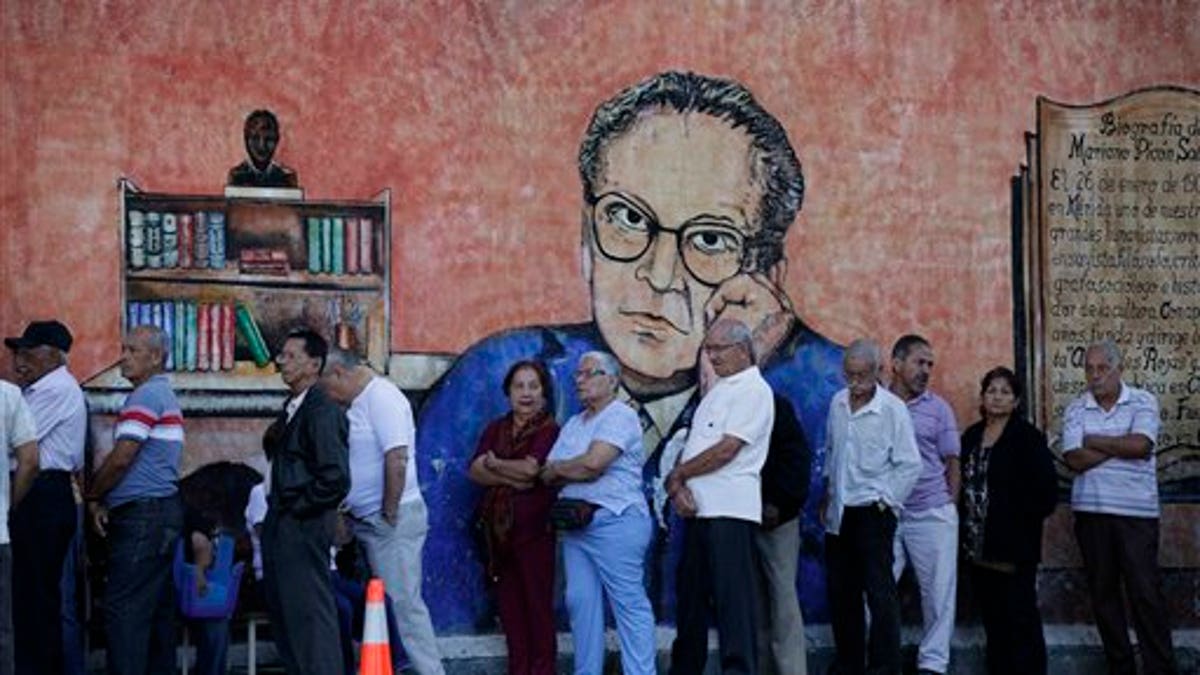
Residents in front of a wall with a painting depicting Venezuelan writer and diplomat Mariano Picon as they wait in line to enter a polling station to vote during municipal elections in Caracas, Venezuela, Sunday, Dec. 8, 2013. Venezuelans head to the polls to elect mayors and city councilors at a moment when the country's economic troubles have deepened, with inflation touching a two-decade high of 54 percent, and shortages of everything from toilet paper to milk spreading while the black market value of the currency plunges. (AP Photo/Ariana Cubillos)
CARACAS, Venezuela (AP) – There's one burning question among economists in Venezuela these days: What happened to the November inflation report?
It's been more than two weeks since the deadline passed for the central bank to publish its closely-watched consumer price index and so far authorities have been mum about when it will be released.
Economists and opposition politicians say the delay is a sign the government is trying to hide its embarrassing record controlling inflation, now running at 54 percent, after President Nicolas Maduro last month delivered a rare rebuke of the way the bank measures prices. They warn of more interference to come, undermining an institution that until now has been a redoubt of balance and credibility amid a decade-long socialist push that has divided Venezuelans.
"The most extreme way of manipulating the data is not publishing it," Victor Olivo, a former manager of macroeconomics analysis at the central bank, told The Associated Press.
The central bank's bylaws require it to publish inflation data within the first 10 days of each month. On the rare occasions when it has missed the cutoff date before, it was late by only a few days.
Intrigue about the delay began to build after the bank abruptly cancelled a Dec. 19 news conference to release the report.
To date, nobody has offered an explanation, even in the face of a public letter of protest signed by 20 recognized local economists. The bank declined to comment when contacted by the AP.
The only official who has defended the bank, Elias Eljuri, president of the national statistics institute, said the delay is due to "atypical" factors stemming from the government's slashing of prices of home appliances last month after it seized several retail chains accused of charging speculative prices.
Under no circumstances are the numbers being cooked, he said.
Maduro last month questioned the reliability of the central bank's data, saying that internal calculations he had seen showed prices fell 5 percent in November as a result of the government's actions.
Are the statisticians at the bank able to "see what's happening beyond the technocracy?" Maduro asked in a nationally televised Cabinet meeting on Nov. 23.
Economists say Maduro's forecast has no basis. While the prices of televisions, stoves and refrigerators did fall by more than half after the government offensive, appliances carry around a 2 percent weighting in the consumer price index, making it impossible to swing the gauge at a time prices for food, clothing and services are rising by more than 5 percent a month.
Economists also depend on the inflation report to monitor another ill battering the South America's largest oil economy: record levels of shortages.
The October report's so-called scarcity index showed that out of 100 products measured, 22 were out of stock.
It's not just the inflation report that has economists concerned the bank is losing its autonomy.
In recent years, the monetary authority has stopped publishing data on private investment and expansion of the money supply, one of the main drivers of inflation. It's also followed through on orders to transfer part of its dollar reserves to fund government spending.
The fear, says Olivo, is that Venezuela will follow in the footsteps of Argentina, which this year became the first country censured by the Washington-based International Monetary Fund for producing unreliable data that wildly underreports inflation.
In 2007, then-Argentine President Nestor Kirchner fired the top staff at the national statistics institute and replaced them with officials who changed the formula used to measure inflation.
"This is what happens when an institution is politicized," said Olivo, who resigned a few years ago to protest what he viewed as the government's encroachment. "The quality of the data produced deteriorates along with the quantity."
Follow us on twitter.com/foxnewslatino
Like us at facebook.com/foxnewslatino
